連接粵港澳三地的世界最長跨海大橋——港珠澳大橋(the Hong Kong-Zhuhai-Macao Bridge),歷經5年前期設計,9年建設,終于將在本周三(10月24日)通車啦!
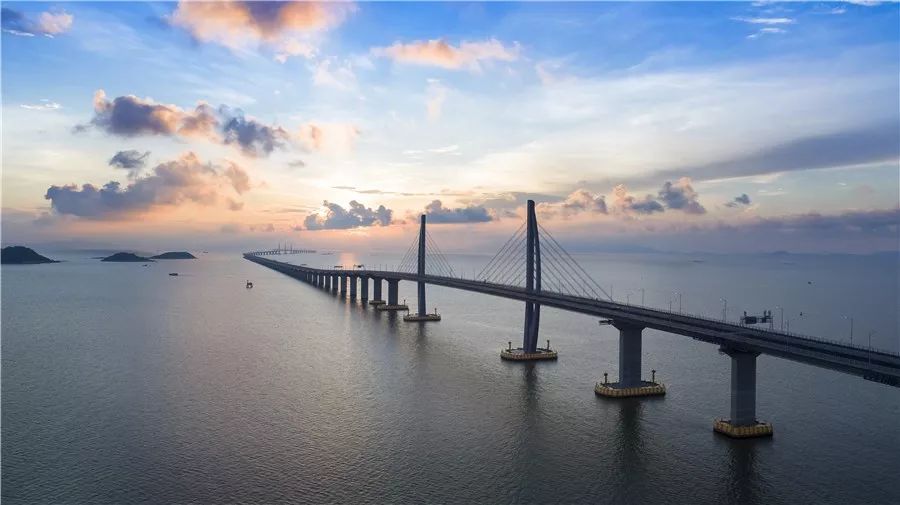
對這個世紀工程還不夠了解?沒關系,中國日報記者針對以往大橋報道收到的讀者留言和反饋,結合過往的采訪資料和政府文件,整理了一份大家最關心的事實合集。
想要使用這座橋或者對我國土木工程最新技術感興趣的小伙伴們,你們想要的信息都在這篇文章里了!
運營篇
什么車可以上橋?有什么交通方式讓我使用這座橋?
請參見以下香港立法會的最新文件。其中穿梭巴士僅在香港與澳門、珠海口岸之間穿梭,不會過境;而巴士則會過境,與現有的經其他口岸來往內地與港澳的跨境巴士運作方式相同;所有公共交通方式均為24小時運作。
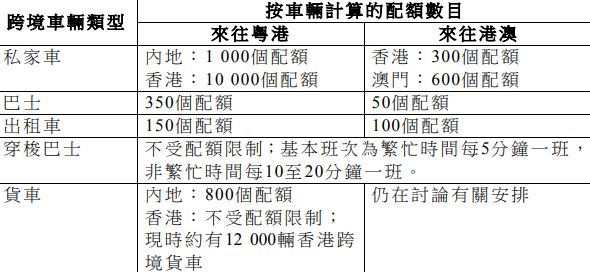
此外,已經獲發(fā)經其他口岸來往粵港的私家車,如:深圳灣口岸、皇崗口岸,政府會在通車后適時開放申請免手續(xù)試用港珠澳大橋;根據香港運輸署的資料,截至2017年,有兩地牌照的香港車輛有30400輛;據港珠澳大橋管理局介紹,內地現有的兩地牌車輛也超過兩萬輛。政府方面均承諾,視大橋開通后的交通量,會動態(tài)調整各車型配額。
由于香港口岸的配套道路沒有完全建成,為避免香港機場附近道路擁堵,三地政府在開通初期會用逐漸發(fā)放配額方式適當限制車流量。隨著配套道路在2020年左右完全建成,車輛配額和通行政策會進一步放開。
Among the vehicle types authorized to use the Hong Kong-Zhuhai-Macao Bridge, shuttle buses will run only between the ports of Hong Kong and Zhuhai/Macao, not crossing any boundaries.
大橋上的車靠左還是靠右行?車速限制是多少?
港珠澳大橋是雙向六車道,限速為100km/h。由于大橋的主體部分位于內地水域,因此車輛都會靠右行駛,待行駛到相應的口岸完成出入境手續(xù)后,會完成左右側交通轉換。
The HZMB has a dual 3-lane carriageway; the speed limit is 100km/h on the main bridge.
As the bridge is mostly located in mainland waters, vehicles will keep to the right of the road. Cars can change to the left after having passed the boundary checkpoints in Hong Kong and Macao.
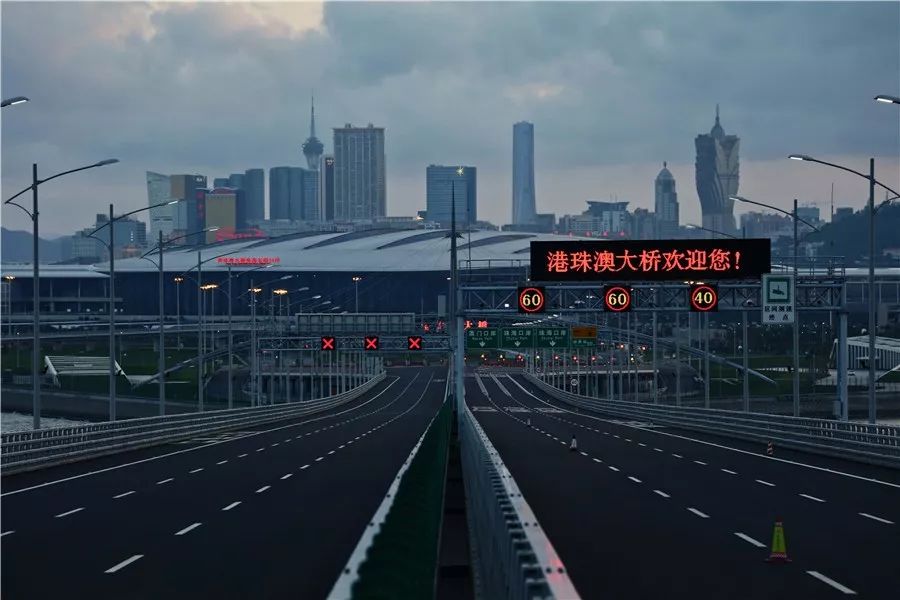
Cross-boundary coaches via HZMB operate similarly to current coaches that run between the Chinese mainland and the two special administrative regions through existing ports, such as the Shenzhen Bay Port.
Cross-boundary private cars under quotas for existing boundary crossings (i.e. Shenzhen Bay and Lok Ma Chau) will be allowed to use the Hong Kong-Zhuhai-Macao Bridge without additional procedures on a trial basis.
According to figures from the Transport Department in Hong Kong, the number of Hong Kong cross-boundary private cars issued with valid Closed Road Permits (CRP) was 30,400 as of 2017.
The number of mainland cross-border boundary cars with such permits is more than 20,000, according to the bridge operator, HZMB Authority.
Governments in Hong Kong and the mainland have both promised flexible adjustment of quotas for cross- boundary private cars in accordance with the traffic volume after the bridge opens.
大橋怎么收費?
收費由港珠澳大橋管理局負責,貨幣為人民幣。大橋只有一個收費站,位于珠海/澳門口岸一側,共設20個收費窗口,全部支持國標ETC用戶和香港的快易通電子繳費系統。除了現金,全部收費窗口都支持銀行卡和電子支付。
The HZMB Authority will be in charge of the bridge toll. The toll is in Renminbi. There’s only one toll plaza with 20 toll gates, which is located near the Macao and Zhuhai ports on the mainland side. All toll gates will be available for auto-toll systems in Hong Kong and Guangdong province. Besides cash, bank cards and e-payment such as WeChat Pay and Alipay are all available.
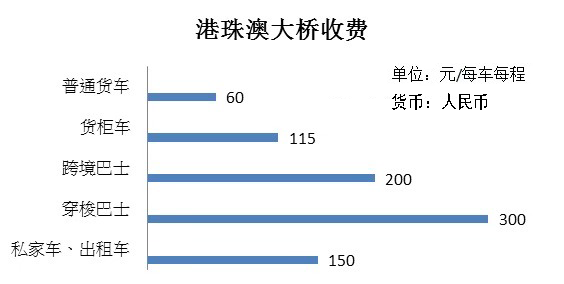
其中,香港與珠海、澳門口岸間的穿梭巴士票價最高為每人63元人民幣,平均約10分鐘一班,車程約40分鐘;跨境巴士的乘客票價視不同城市目的地有所不同,例如,香港紅磡到澳門威尼斯人約150元人民幣,車程約110分鐘;香港九龍至珠海市區(qū)票價則約100元人民幣,車程約75分鐘。相比航程70分鐘單程約175元人民幣的船票,提供點對點服務的巴士票價還是很有競爭力的!
三地共建的大橋,誰負責管理?如何通關?橋上發(fā)生意外怎么辦?
答案當然是三地共同管理啦,港珠澳大橋管理局了解一下。它是由香港特別行政區(qū)政府、廣東省人民政府和澳門特別行政區(qū)政府共同設立的事業(yè)單位。主要任務是:承擔港珠澳大橋主體部分的建設、運營、維護和管理等工作。
The Main Bridge located in mainland waters will be managed by the Hong Kong-Zhuhai-Macao Bridge Authority, which was jointly founded by the governments of Guangdong province, Hong Kong Special Administrative Region and Macao SAR in 2010. It is responsible for the construction, operation, maintenance and management of the Main Bridge.
管理局設立在珠海,同時,在大橋的東、西人工島上,會有道路救援、養(yǎng)護、消防等部門入駐,負責大橋的日常運營、維護和應急處理。
The Authority is located in Zhuhai. Meanwhile, there are monitoring centers and departments charged with responsibilities such as road rescue, maintenance and fire services, on the west and east artificial islands of the bridge, for daily operation, maintenance and emergencies.
香港口岸、珠海和澳門口岸也都是24小時開放,由三地政府各自負責設立和管理,實行“三地三檢”;其中珠海和澳門之間采取“合作查驗、一次放行”的創(chuàng)新模式,即旅客可以一次性完成珠海和澳門之間的出境和入境手續(xù)。
The ports in Hong Kong, Zhuhai and Macao will be open 24 hours daily. They are built and managed by local governments respectively.
Zhuhai and Macao will cooperate to implement a one-off customs clearance in the two ports. The two cities will share immigration data, allowing travelers to finish the exit and entry process in one pass.
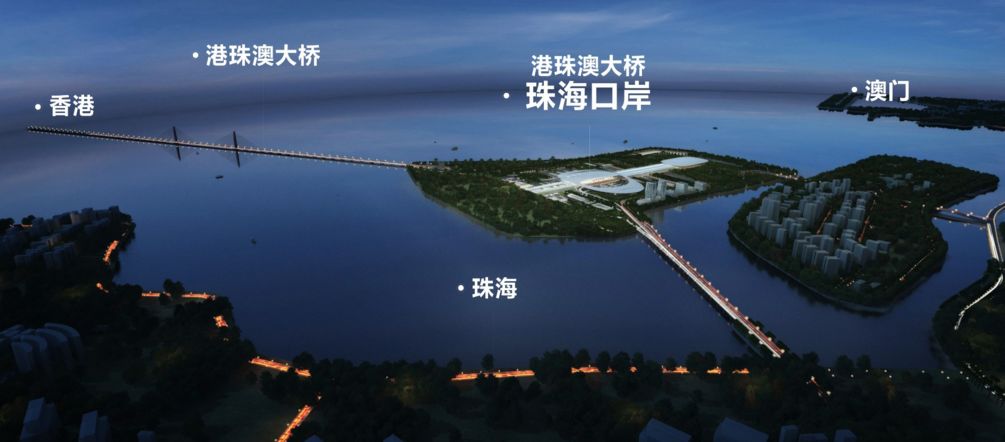
建設篇
大橋多長?為什么中間還有隧道和人工島?
港珠澳大橋是一個全長55公里的橋島隧綜合跨海工程,也是目前世界上最長的跨海大橋。大橋包含一段6.7公里的海底隧道,是我國第一條外海沉管隧道,也是目前世界上最長的公路沉管隧道。它通過東西兩個海中人工島與橋梁部分連接。
HZMB is a 55-kilometer long bridge-island-tunnel complex across the Pearl River Estuary. It is the world’s longest sea crossing. The bridge consists of a 6.7-km undersea tunnel, which is the country’s first offshore immersed tunnel and the world’s longest immersed tunnel for road traffic. It is connected to the bridge through two offshore artificial islands.
為什么要建這么一條隧道呢?為了給珠江口將來的航運發(fā)展預留可通行30萬噸郵輪的航道。由于航道位置靠近香港國際機場,滿足相應航道寬度的斜拉橋的橋塔會超過機場附近的空域限高,因此只能走海下,建隧道。
The tunnel is built to reserve room for a planned shipping channel for passenger liners with a displacement of 300,000 tons. As the planned location is close to the Hong Kong International Airport, where there is height limitation in the airspace, a tunnel must be built subsea instead of a bridge with tall towers.
大橋是什么時候開始建的?花了多少錢?
在珠江口建跨海大橋的方案最早由香港實業(yè)家胡應湘先生于1983年提出,幾經波折,于2004年經由國務院批準后正式開始進行可行性研究,2009年批準研究報告,并于2009年12月15日正式開工,由時任國務院副總理李克強在珠海舉行開工典禮。
The plan to build a link road across the Pearl River Estuary was first initiated by Hong Kong industrialist Gordon Wu Ying-sheung in 1983. After several twists and turns, the Feasibility Study started in March 2004 under State Council’s approval. The study report was approved in October 2009, followed by a commencement ceremony on Dec 15 in the same year, chaired by then Vice-Premier Li Keqiang in Zhuhai.
大橋總投資額約1200億人民幣,其中三地投資共建的主橋部分,長29.6公里,占其中的480.68億元。剩余部分為各地政府投資興建的口岸和連接線。
主橋的480.68億元投資里,57.5%為銀行貸款,會由大橋未來30年的通行費償還;剩下42.5%為政府投資,其中香港特區(qū)政府占43%,廣東省政府和中央政府占44.5%,澳門特區(qū)政府占12.5%。這一比例是三方政府根據大橋建成后各自可獲得的經濟效益占比擬定的。
So far, the latest cost of HZMB is about 120 billion yuan (US$17.4 billion), of which the 29.6-km Main Bridge invested by three governments is about 48.1 billion yuan. The rest are investments by individual governments on their ports and link roads to the Main Bridge.
The cost allocation among the three governments shown as above is settled by the assessment of economic benefits they can get after the bridge opens.
作用篇:
為什么要建這座橋?
? 對香港:連接珠江口西岸,為經濟發(fā)展打開腹地,與粵西、廣西省等建立更快速的陸路連接,鞏固香港航運中心、空港中心、國際貨柜碼頭的地位;加強與祖國內陸的交流,進一步融入國家發(fā)展大局
? 對內地:帶動粵西和廣西的經濟發(fā)展;促進特區(qū)與內地交流;增加粵港澳大灣區(qū)內交通聯系,促進粵港澳大灣區(qū)發(fā)展;更好地利用香港發(fā)達的航運和國際聯系;通過陸路將香港與西部廣袤的大陸連接,直通東南亞,促進“一帶一路”發(fā)展
? 對澳門:增強與香港和內地的聯系,促進產業(yè)多樣化
通車后,由珠海至香港葵涌貨柜碼頭的陸路通行時間,將由現在的3.5小時縮短至1小時15分鐘;由珠海至香港國際機場的陸路通行,將由4小時縮短至45分鐘。
除了縮短客運時間,更重要的是,兩地的貨運有了直接的陸上通道,這對于兩岸物流業(yè)、會展業(yè)、食品行業(yè)等需要快速交通支援的行業(yè),將有非常顯著的促進作用。
The most important benefit is that the bridge will provide the east and west of the Pearl River Estuary with direct road connections, which can enormously facilitate the development of industries that rely on fast transportation, such as logistics, food and convention and exhibition.
為什么港珠澳大橋不連接深圳?
大橋主要設計師和總工程師說,其實2003年大橋的前期規(guī)劃選址時就考慮了這個問題。連接深圳的所謂“雙Y”方案,其實是一個想少花錢多做事的經濟學概念。實際上,從工程角度來講,一座橋承載不了這么多功能,“紙上畫容易,實際在技術上和未來的管理上會有很多難題”,大橋設計師之一劉曉東告訴《中國日報》。
將來珠江口會有5條通道,每個通道作用不同,而深圳和珠江口西岸的連接由在建的深中通道實現。港珠澳大橋率先建設,可能不是交通量最大,但作為大灣區(qū)第一個物理連接,會為整個灣區(qū)的產業(yè)布局和發(fā)展做準備。
同時,港珠澳大橋也為其他跨海工程儲備了一大批優(yōu)秀的工程師和管理者。目前在建的深中通道,就是一個在港珠澳大橋沉管隧道、人工島等關鍵技術突破的基礎上興建的另一個“橋島隧”綜合跨海工程。
Looking toward the future of the Guangdong-Hong Kong-Macao Greater Bay Area, Liu Xiaodong, a major designer of HZMB, told China Daily that there will be five bridges across the Pearl River Estuary by around 2035, or one sea crossing every 20 kilometers parallelly.
Future traffic demand was taken into account during the preliminary design for the bridge, back in 2003, Liu said.
“You can’t expect one bridge to meet all needs,” Liu said. “HZMB may not carry the largest traffic volume; as the first sea crossing in the Pearl River Estuary, it will pave the way for the adjustment of industrial structure in the Bay Area,” he said.
HZMB has also accumulated precious experience for similar projects in the future.
The under-construction Shenzhen-Zhongshan Link is a perfect example. Based on technologies, marine data, talents and all the other experience from HZMB, the new link is also a bridge-island-tunnel complex, about 40 kilometers to the north of HZMB.
記者/圖表:何疏思
監(jiān)制:宋平 李瑤 劉予涵
出品人:周立
圖片:鄧永安 港珠澳大橋管理局 格力地產
中國日報亞太分社出品
